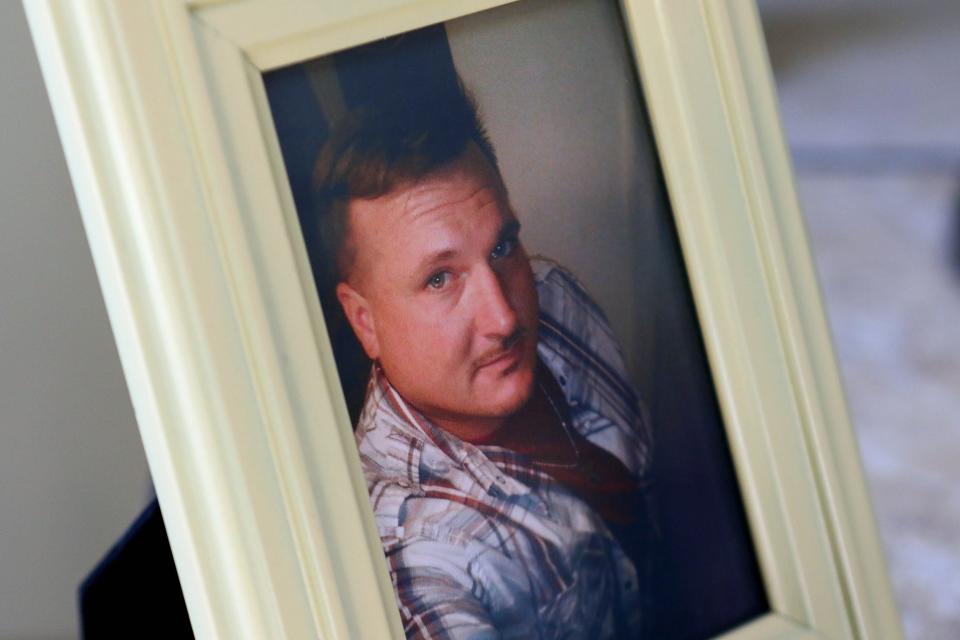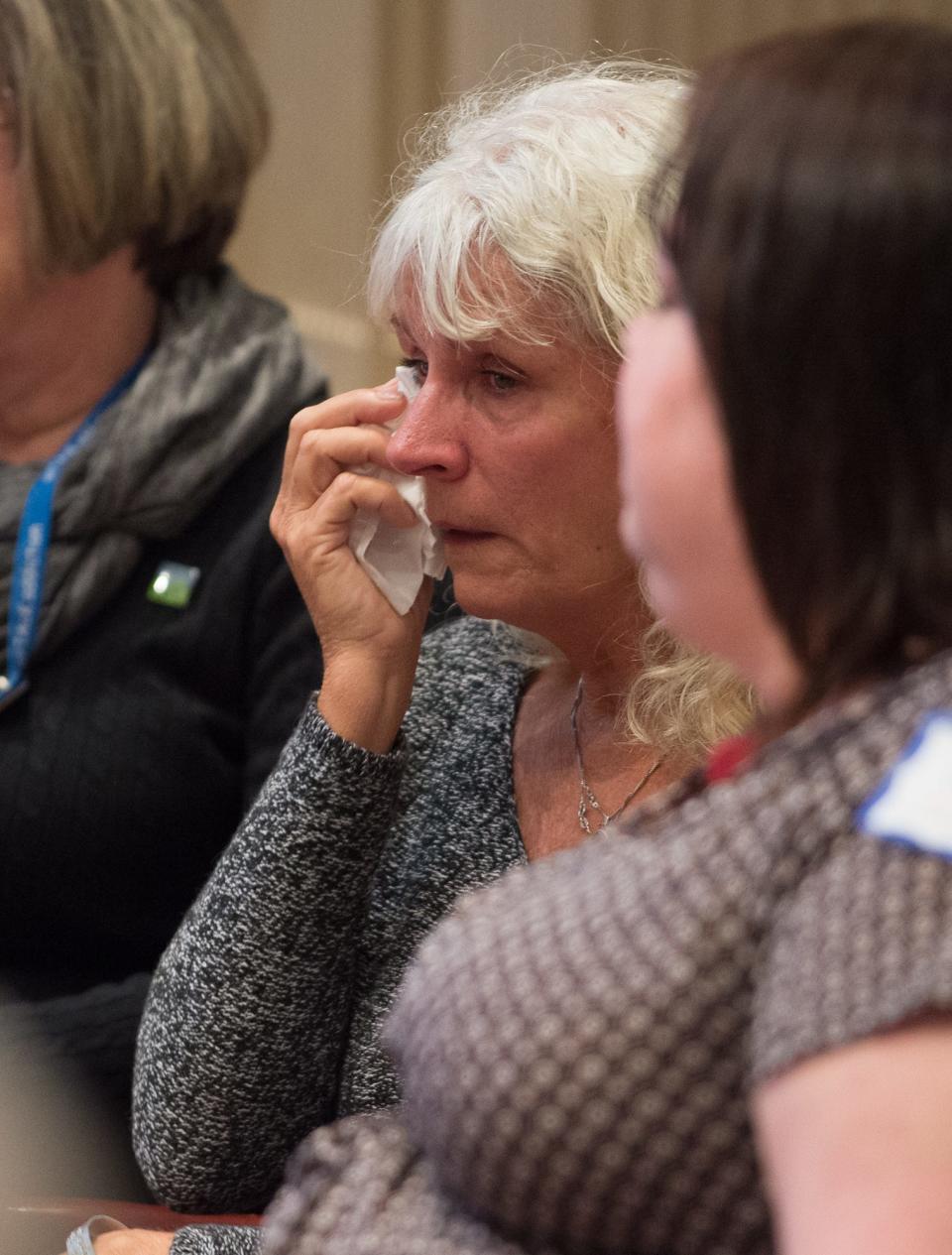Her son died after being kicked out of a Florida sober home. How Delaware may prevent that
MaryBeth Cichocki’s son was living 1,100 miles from Delaware when she learned he was dead.
It was January 2015 and 37-year-old Matt Klosowski had moved to a sober living home in Boca Raton, Florida, about seven months earlier. He had been in and out of rehab numerous times for opioid addiction and needed to get far away from Lewes, where he’d previously been living.
At the time, Cichocki believed Klosowski was sober – now, she knows he had relapsed while in Boca Raton. But she said he was a “functioning user,” someone who held down a steady job while trying to get clean.
One night in early January, a roommate broke curfew. As punishment, Cichocki said, the owner of the sober home woke everyone up and demanded urine screens. It was immediately clear that Klosowski had been using, and he and his roommate were kicked out of the house.

The roommate told the Palm Beach Post in 2016 that Klosowski was already high when they were forced to leave. Instead of taking Klosowski to the emergency room, however, the owner of the facility dropped him and the friend at a nearby motel.
It was 2:30 a.m. on a Saturday.
Within hours, Klosowski was dead, having mixed Percocet with Xanax, the roommate said. Cichocki, who was a nurse in Delaware at the time, was informed of her son’s death by her husband, who came to her place of work later that day to notify her.
XYLAZINE IN FENTANYL: The race to treat wounds caused by 'tranq dope' in Delaware before amputation is needed
In the months that followed, Cichocki learned that sober homes in Florida were largely unregulated and that residents had few protections. For a number of years, she believed it was a “Florida thing” and focused much of her attention on putting the owner out of business.
But several years ago, as she became increasingly involved in addiction advocacy work in Delaware, Cichocki learned that the First State, too, had few regulations. Anyone, she said, “can come into Delaware, rent a property, put a sign on it and call it a sober home.”
“They do not have to be licensed; they don't have to be certified,” she said. “They don't have to have any regulations, and it’s ridiculous.”
That changed last month when the Delaware Senate unanimously passed a bill to create a voluntary certification process for sober homes. The House of Representatives unanimously passed the bill on June 22.

While the bill is just a first step, Cichocki was emotional as she addressed both the House and Senate last month, thanking legislators for its passage.
“I asked you to do something and you did it,” Cichocki told legislators after the House vote. “I can't even tell you how much this means to me that we can now save other people from becoming my son.”
What does the legislation do?
Though the bill, which was three years in the making, does not require recovery homes to be certified and instead makes it a voluntary process, the legislation incentivizes accreditation.
When Gov. John Carney signs the bill into law − as he's expected to − state agencies, courts or entities that contract with the state will not be able to refer users to a recovery house in Delaware unless it’s a certified sober home or is in the process of getting certified. Additionally, only certified homes will be eligible to receive state or local funding.
READ: They were parents, friends and colleagues. This gallery shows them beyond their addiction
For homes that do not yet have certification, the referring agency must receive confirmation from the certifying organization that the recovery house has applied for accreditation.
The certification process includes training and regulations based on national standards, including that if a recovery house terminates a resident’s admission, it must “make a reasonable effort to connect the resident with appropriate services,” unless the resident refuses.
This means that users who relapse or are evicted from their homes for another legitimate reason could not be dumped at a nearby motel like Klosowski. The homes must also collect and report data on where former residents who complied with a request to leave or were removed from the certified house go after leaving.
Sober homes would also have to renew their certification every two years.
“Even with the best intentions, lack of accountability will lead to lower standards,” said Rep. Kerri Evelyn Harris, a Democrat representing East Dover who sponsored the bill.
Additionally, the legislation would create an online registry of all certified recovery houses in Delaware. That way, those struggling to get sober can easily navigate a trusted site with centralized information rather than being forced to find homes and learn about them on their own.
The registry would also include key information such as contact information for the home, where it's located and whether it has availability.
RECENT ADDICTION NEWS: 'Tranq dope' is killing Delawareans. The state hopes these tests will help curb overdoses
The bill would also create a recovery home certification fund. The fund would collect money from violations of the legislation, which would then be used to further implement the bill.
Initial funding for the legislation comes from American Rescue Plan Act funds.
Grief into action
When Klosowski moved from Delaware to Boca Raton, neither he nor his mother knew that southern Florida “was the hub of the pill mill industry,” Cichocki said. They also didn’t know just how unregulated sober homes there were.
The facility Klosowski was living in, Cichocki said, was run by a man with “no education, no certification, nothing.”
“He just rented an apartment building and called it a sober home,” she said.
As a result, residents there and elsewhere had few protections. They also had few rights under Florida’s landlord-tenant laws, which required a week's written notice before a renter could be evicted.
RECENT: Drugs and violence have long plagued this Claymont community. How a peace walk may help
At the time of Klosowski’s death, most sober home owners said landlord-tenant laws didn’t apply to them because sober housing is related to medical treatment.
A number of cities, such as nearby Delray Beach, had passed ordinances that required sober home operators who wanted to evict a resident to provide housing for at least 48 hours or give them written notice that they must leave in 48 hours. The ordinances came about in hopes of preventing homelessness and crime.
Yet the local laws didn’t specify what kind of housing the operators had to provide. As a result, many residents were dropped at nearby cheap motels, which were typically located in seedy areas where drugs were prevalent.
In Klosowski’s case – and in numerous other cases that media outlets have reported on over the years – this proved deadly.
“They treated Matt like he was a commodity, like he was disposable income,” Cichocki said. “But that’s why this bill – called the Matthew D. Klosowski Act – has my heart.
“I don't want another mother to hear that their kid was kicked out of a sober home in the middle of the night and overdosed and died on the street.”
Got a tip? Send to Isabel Hughes at ihughes@delawareonline.com or 302-324-2785. For all things breaking news, follow her on Twitter at @izzihughes_
This article originally appeared on Delaware News Journal: Delaware sober homes to get accreditation process to improve outcomes

